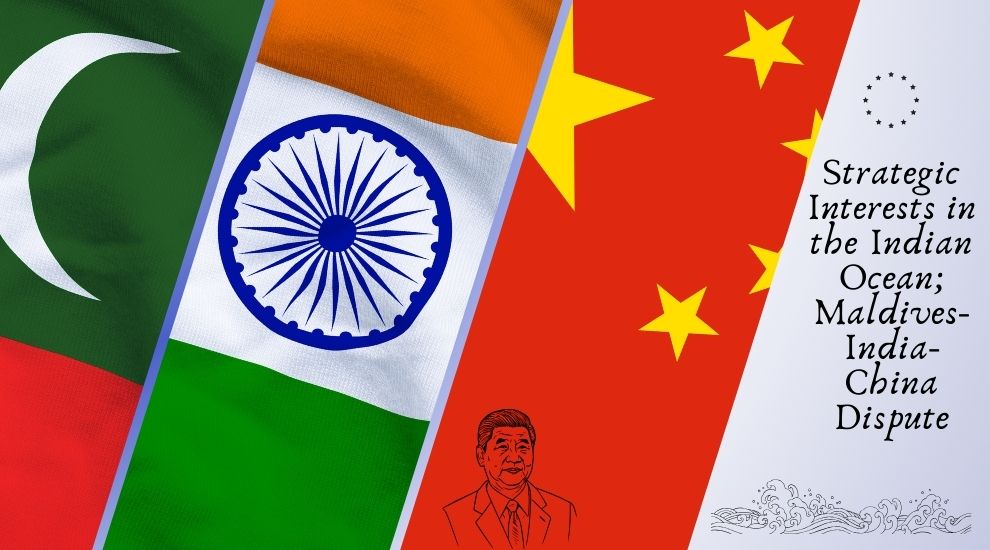
You can’t miss the rising tensions between India and China over Chinese ships entering Maldivian waters. This escalating maritime dispute raises critical questions about the strategic interests of the major powers in the Indian Ocean region. The Maldives holds immense geostrategic significance, given its location along vital sea lanes in the Indian Ocean.
While India has traditionally wielded influence here, China’s growing presence through its Belt and Road Initiative has sparked concerns. Understanding the historical context and motives behind the actions of India and China is key to assessing the implications for regional security. As the situation remains delicate, diplomatic efforts to peacefully address the issue are vital to maintaining stability in South Asia. This complex geopolitical tale of three powers in the Maldives underscores the need for dialogue and cooperation.
Background: The Complex History of the Maldives Region
The Maldives has a long history of foreign influence, located along major trade routes in the Indian Ocean. Traditionally, India has maintained close ties with the island nation. However, China has recently increased its presence, investing billions in infrastructure projects. This escalating geopolitical tension creates instability in the region.
India sees the Maldives within its sphere of influence and has provided military and economic aid for decades. India worries China may gain control of strategic ports and sea lanes. Meanwhile, China’s interests in the Maldives relate to its Maritime Silk Road project, using economic deals to gain strategic footholds along vital trade routes.
In 2022, Indian and Chinese warships anchored off Malé, the Maldivian capital, highlighting the islands’ strategic importance. The Maldives must balance the interests of regional powers while asserting its sovereignty. All sides would benefit from multilateral talks addressing security concerns and clarifying intentions.
The Maldives’ location, between key shipping lanes in the Indian Ocean, gives it geopolitical significance. However, its economy depends heavily on tourism and foreign investment. Regional stability and cooperation are essential to the Maldives’ prosperity.
Dialogue and diplomacy offer the best path forward. Power dynamics in South Asia are complex, and escalating tensions often lead to unforeseen consequences. The interests of all parties would be best served through open communication and a commitment to peace. With prudent leadership, the Maldives can maintain positive relationships with India and China, ensuring security and economic growth. But if tensions rise, instability may spread throughout the region.
The Strategic Significance of the Maldives for India and China
The Maldives may be small, but its location is strategically important for regional powers like India and China. Situated in the Indian Ocean, the Maldives controls important sea lanes and trade routes. For India, the Maldives is critical to protecting its western coastline and maintaining its regional influence. For China, establishing a presence in the Maldives is key to expanding its Belt and Road Initiative and controlling the Indian Ocean.
Additionally, for India, the Maldives is essential to safeguarding national security. India has close cultural and economic ties with the island nation and has provided military and financial aid to the Maldives for decades. However, India is wary of China’s growing influence, concerned that China may establish a military base there. India sees Chinese ships in Maldivian waters as a threat and closely monitors the situation.
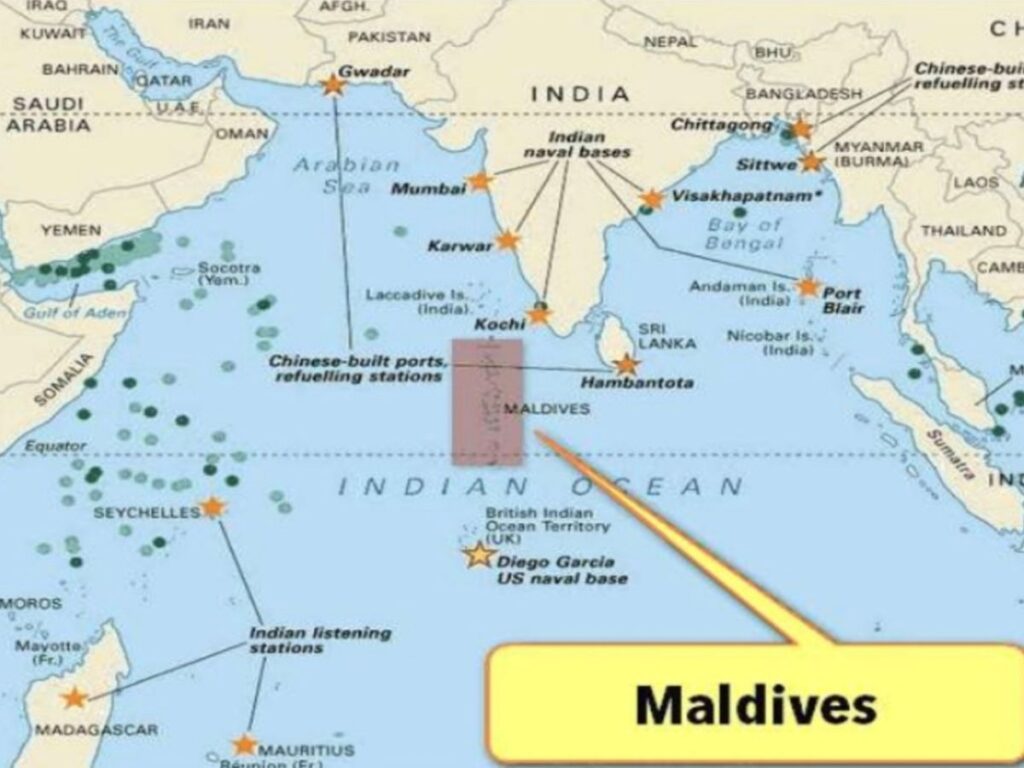
China’s interest in the Maldives is primarily economic and tied to its Belt and Road Initiative, a massive infrastructure project to connect China to economies in Asia, Europe and Africa. The Maldives signed a free trade agreement with China in 2017, and China is funding several infrastructure projects in the Maldives, including a friendship bridge. However, India and other countries worry that these economic ties may lead to a Chinese military presence, allowing China to project power in the Indian Ocean.
The dispute over Chinese ships in Maldivian waters highlights the strategic significance of this island nation and the power struggle between India and China taking place in the Indian Ocean region. The situation calls for open communication and cooperation to avoid conflict while respecting the Maldives’ sovereignty. All parties must unite through dialogue and find a resolution that maintains stability in South Asia.
Recent Tensions: Chinese Ships Enter Disputed Waters
The escalating tensions between India and the Maldives were further exacerbated when Chinese ships entered disputed waters claimed by both countries in early January 2024.
The Maldives is facing a boycott of one of its biggest sources of tourism revenue after three officials mocked Indian Prime Minister Narendra Modi, prompting calls from Indian citizens and celebrities to avoid vacations, sunbathe and head to the country’s beaches.
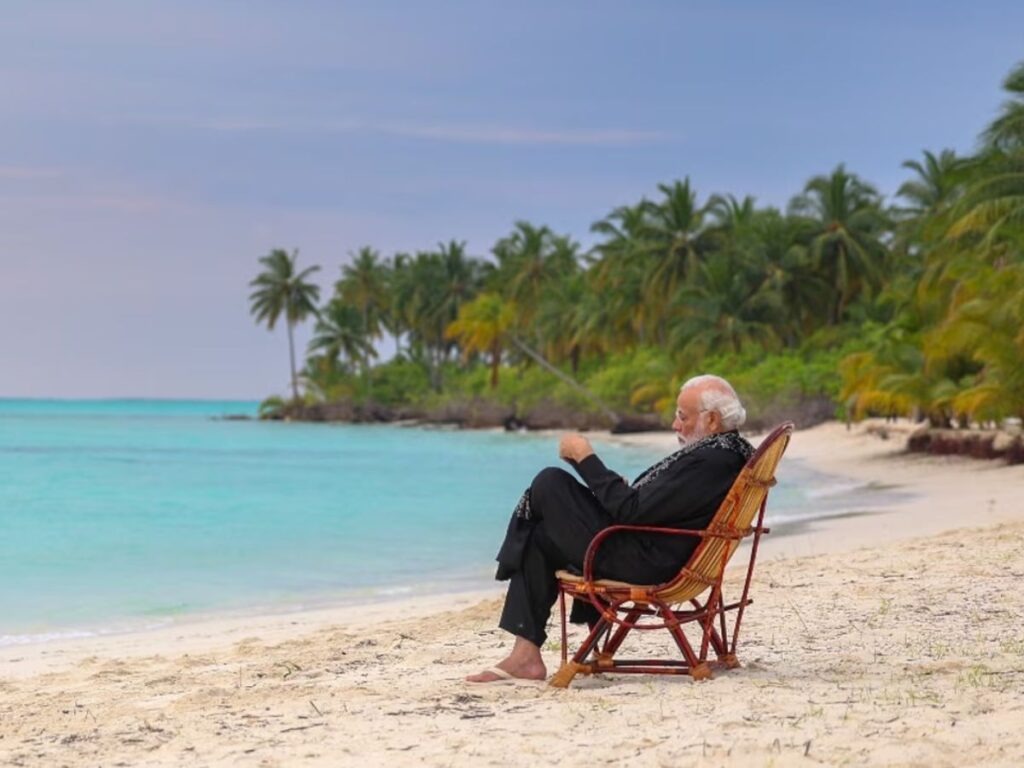
Modi sparked controversy after posting a photo on a social platform. In his post, Modi did not mention India’s picturesque neighbour, the Maldives. Still, his enthusiastic praise of the little-known archipelago’s beautiful scenery could be a charm offensive to lure people to vacation there rather than Go to the Maldives.
Three officials in the Maldives responded to his post, calling Modi a “clown,” a “terrorist,” and an “Israeli puppet,” Reuters reported.
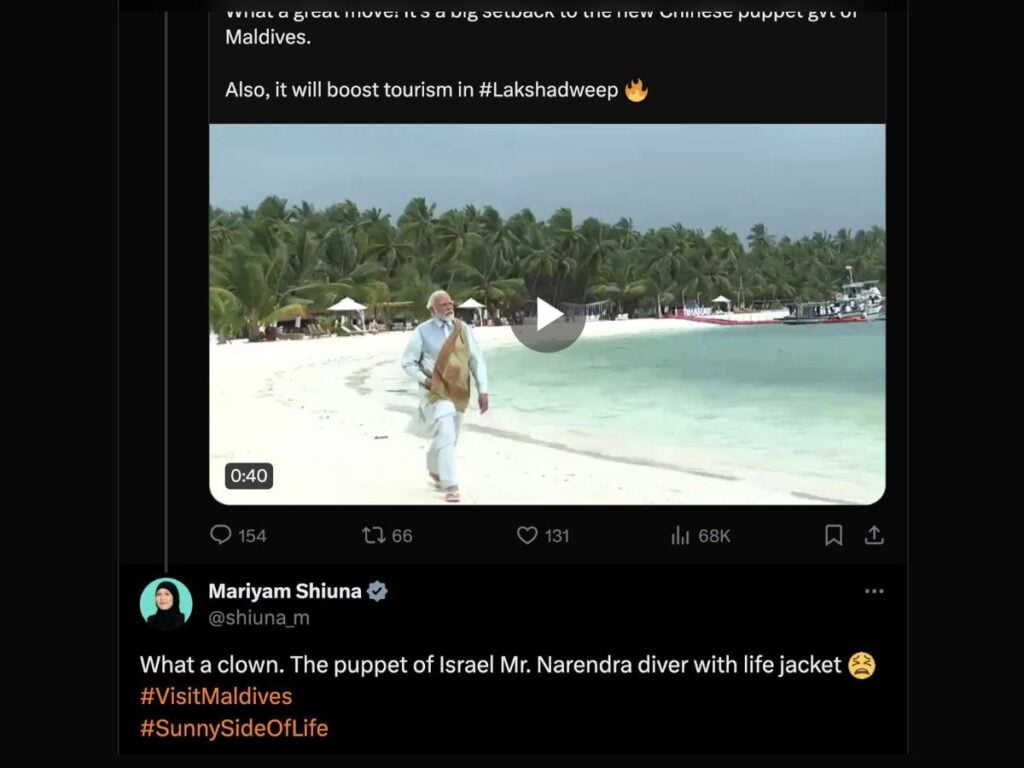
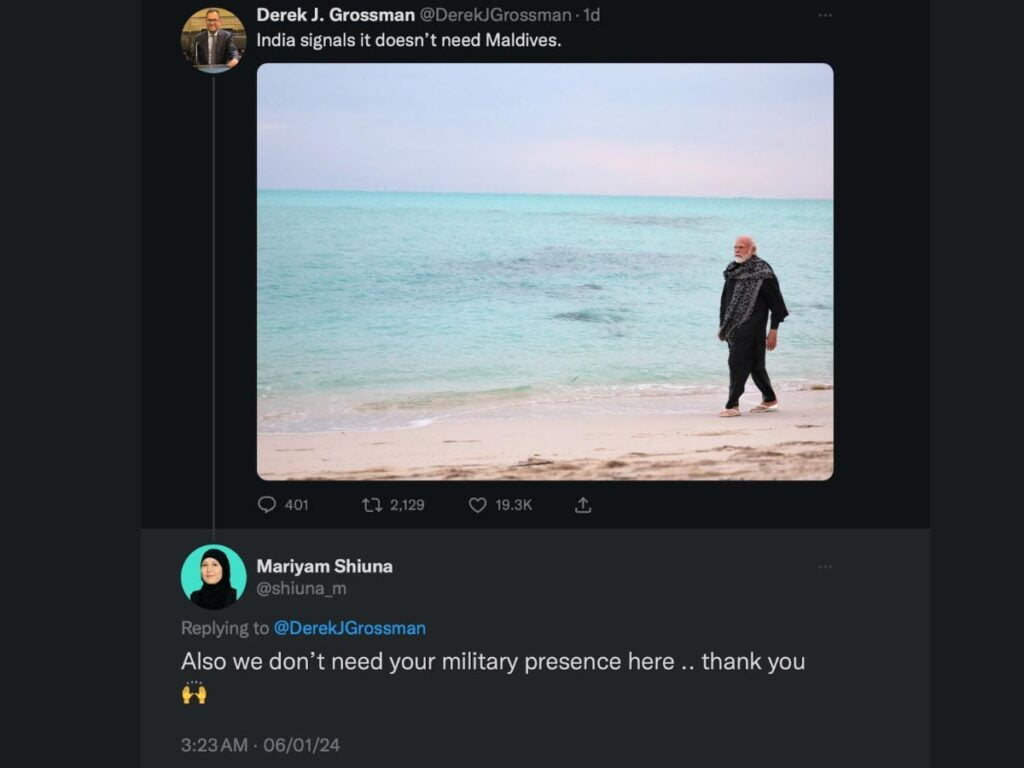
The Maldivian government quickly distanced itself from his comments and suspended three officials – the deputy minister of youth employment, information and the arts – a senior Maldivian official told Reuters on Sunday.
The Maldives government stated that it was aware of “offensive” comments posted on social media. Still, it stressed that “these opinions are personal” and do not represent its views.
“The government believes that freedom of expression should be exercised in a democratic and responsible manner and without spreading hatred and negativity or hampering the close relations between the Maldives and its international partners,” he said.
The incident occurred as Maldivian President Mohamed Moizu began a five-day visit to China, his first inauguration since winning elections last October.
Pro-China Stance in Maldives
Moizo is known for his pro-China stance and has pledged to end his predecessor’s “India first” policy in a region where New Delhi and Beijing compete for influence.
During his visit, he is expected to meet Chinese officials and sign “important agreements to promote business, professional, and social and economic development,” according to a government statement.
But despite Moizo’s interest in forging closer ties with Beijing, the small archipelago in the Indian Ocean – home to about half a million people – cannot distance itself from its nearest neighbour.
The Maldives relies heavily on tourism, with much of its revenue coming from India; last year, the world’s most populous country had the highest number of visitors to its tropical beaches, according to the Maldives tourism website.
Last week’s statistics show that the number of Indian tourists visiting the Maldives will exceed 209,000 in 2023, accounting for 11% of the Maldives’ tourism market. Russia contributed almost as much, with China not far behind, providing 187,118 views, or 10% of the total.
But the officials’ comments angered some Indian tourists, who posted screenshots on social media showing they had cancelled trips to the island chain with the hashtag #BoycottMaldives.
Celebrities ranging from Bollywood actors to cricketers also urged fans to travel to local destinations, with another hashtag, #ChaloLakshadweep (meaning “Let’s go to Lakshadweep,” a place Modi visited) gaining traction.
The All India Traders Federation, one of India’s largest trade bodies, has also asked its members to suspend business with the Maldives.
“Until the Maldives apologizes or ensures corrective action, the Indian business community will avoid doing business with them,” said Praveen Khandelwal, secretary-general of the organization representing thousands of Indian traders and trade associations.
A source told CNN on Monday that the Indian High Commission in the Maldives “strongly raised and expressed concerns” to the Maldives Ministry of Foreign Affairs.
Michael Kugelman, director of the South Asia Institute at the Wilson Center in Washington, said the Maldivian government’s quick action to suspend the officials and condemn their comments showed how seriously it values its relationship with India.
India’s Concerns
The presence of Chinese military vessels so close to Indian borders and in waters that India considers its own caused alarm in New Delhi. India has long viewed the Maldives as within its sphere of influence and sees any outside power gaining a foothold as a threat to its security. India worries China may establish a permanent military presence in the Maldives, allowing it to monitor Indian naval activity and threaten Indian trade routes closely.
China’s Motivations
For China, sending ships into the disputed waters serves several purposes. First, it signals to India that China does not recognize India’s claims in the region and will defend its interests. Second, it supports the Maldives and furthers China’s goal of expanding its influence in South Asia and the Indian Ocean. Finally, China likely hopes that by provoking tensions with India, it can portray itself as the Maldives’ protector against foreign aggression. This helps China strengthen its ties with the island nation.
A Delicate Situation
The situation is delicate because the Maldives risks angering either India or China with any move it makes. While the Maldives values its historically close relationship with India, China has invested heavily in the Maldives’ economy through its Belt and Road Initiative. The Maldives must balance these competing powers to avoid being caught in the middle of their rivalry.
All sides would benefit from open communication and diplomacy to clarify their positions, reduce misunderstandings, and find areas of cooperation. Multilateral talks, including India, China, the Maldives, and other regional actors, could promote trust and stability. Compromise and recognizing shared interests may offer the best path toward defusing tensions.
India’s Concerns Over the Maldives and the Indian Ocean
As India’s closest neighbour in the Indian Ocean region, the Maldives is strategically important to New Delhi. India has traditionally enjoyed close ties with the island nation and considers the Maldives within its sphere of influence. However, India is worried about China’s growing presence in the Maldives and views it as a threat to its security interests in the Indian Ocean.
China’s investments in infrastructure projects like ports and airports in the Maldives as part of its Belt and Road Initiative (BRI) have raised alarms in New Delhi. India fears these could be used for military purposes in the future, allowing China to expand its strategic footprint in the region. Moreover, India is particularly concerned about China gaining control of strategic outposts near major sea lanes of communication and trade routes in the Indian Ocean that are vital for its security and economy.
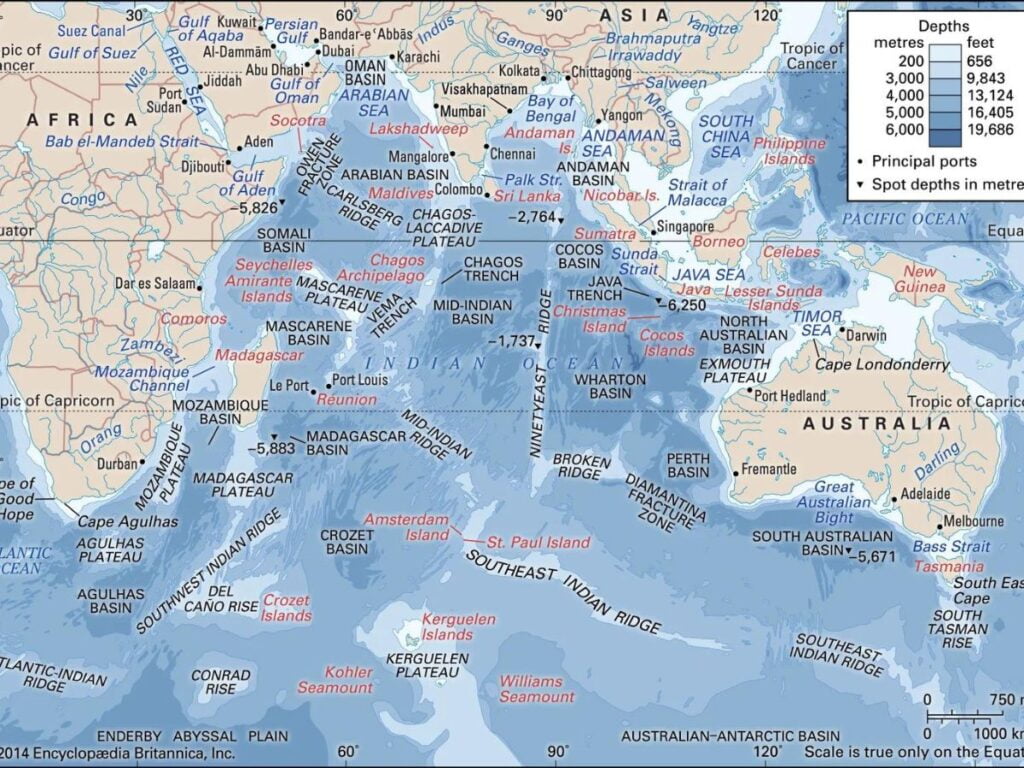
India also worries that China’s debt diplomacy through unsustainable loans and investments in the Maldives could undermine the latter’s sovereignty and make it politically vulnerable to Chinese influence. There are concerns China may use this economic leverage to gain strategic benefits and access in the region, which works against India’s interests.
New Delhi has urged Male to exercise caution in its engagement with China. However, India’s calls for transparency and responsible lending have yet to be well received by the Maldivian government. India is worried the pro-China stance of the current Maldivian administration could sideline its role in the nation. This has strained the traditionally close India-Maldives relationship and New Delhi’s position in its maritime neighbourhood.
India has ramped up its diplomatic engagement with the Maldives to address these concerns and balance China’s presence. It has also boosted strategic cooperation through defence partnerships and humanitarian assistance to the island nation. However, China’s deepening political and economic ties with the Maldives complicate India’s efforts to maintain its regional influence. Resolving these issues through dialogue and cooperation is important for peace and stability in South Asia.
China’s Motivations: Economic and Military Interests
China has clear motivations for increasing its presence in the Maldivian waters. Economically, the Maldives is strategically located along China’s Maritime Silk Road, part of the ambitious Belt and Road Initiative (BRI) to expand trade and infrastructure networks across Asia, Africa and Europe. Investing in the Maldives allows China to gain a strategic foothold in a key maritime chokepoint and bolster its economic interests in South Asia.
Militarily, China seeks to expand its naval reach into the Indian Ocean to protect its trade routes and energy supplies. Establishing a military presence in the Maldives—even if ostensibly for counter-piracy operations—allows China to project power close to India and secure its maritime interests. This aligns with China’s long-term goal to build a “string of pearls” with military facilities across the Indian Ocean.
For China, deepening ties with the Maldives also provides strategic benefits in its broader geopolitical competition with India. By courting India’s neighbours like the Maldives, China aims to challenge India’s dominance in South Asia and the Indian Ocean region. Increased Chinese naval activity in India’s maritime backyard may make India’s leaders feel encircled, fueling distrust and rivalry between the two Asian powers.
To secure its economic and military interests, China provides generous loans, investments and financial aid to the Maldives under its BRI framework. This makes the Maldivian government increasingly reliant on and obligated to China. However, China’s overtures also stir concerns over the Maldives’ sovereignty and debt-trap diplomacy. The Maldivian crisis highlights the complex regional dynamics between India and China as they jostle for power and influence along vital sea lines of communication.
Dialogue and cooperation are needed to address the issue constructively while respecting the Maldives' autonomy. As key stakeholders, India and China must work to build trust and find common ground to ensure stability in the region. The crisis allows India and China to unite rather than allow strategic miscommunications and misperceptions to drive them apart. A resolution to ease tensions in this island nation may be found with prudent diplomacy.
Chinese Vessel in the Arabian Sea
The escalating tensions in the Maldives have wider implications for security and geopolitics in South Asia. As India and China assert their influence over the island nation, neighbouring countries are closely monitoring developments.
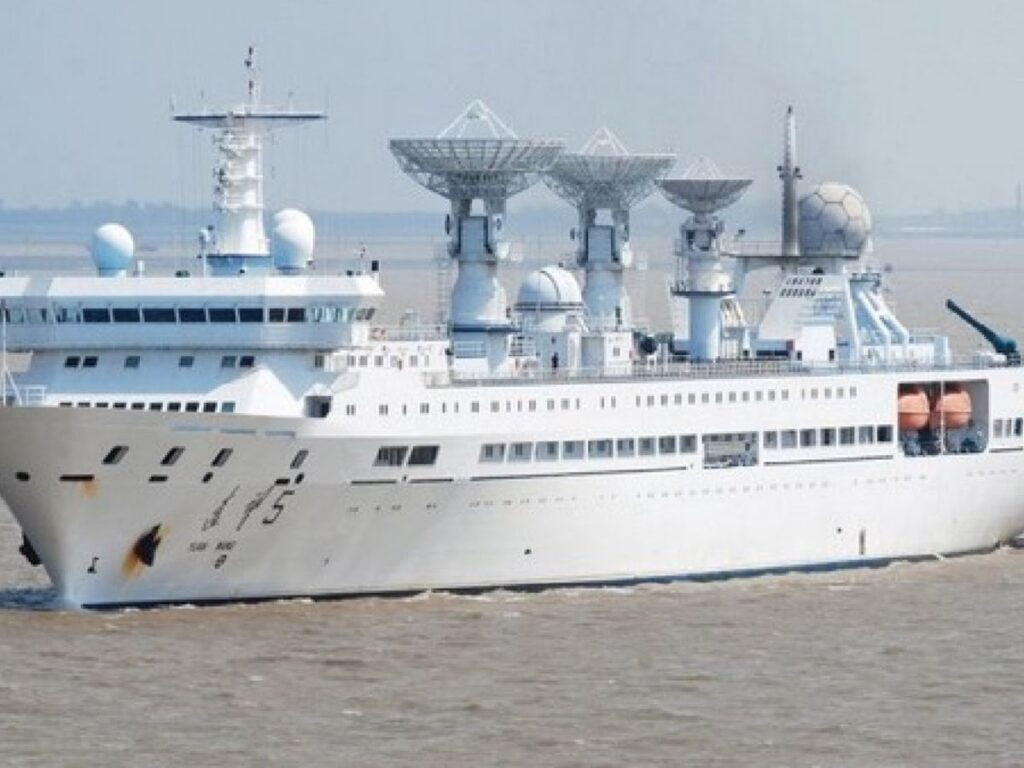
India’s Sphere of Influence
India sees the Maldives as part of its traditional sphere of influence and is concerned about China’s growing presence close to its borders. India’s security interests in the Indian Ocean region could be threatened if China establishes a strategic foothold in the Maldives. India’s response to the crisis will signal its resolve to counter China’s ambitions in South Asia.
China’s Maritime Silk Road
For China, the Maldives is important for its Maritime Silk Road initiative to expand its economic and military power. Access to ports and infrastructure in the Maldives could boost China’s naval power projection in the Indian Ocean. China also sees the Maldives as another South Asian country it can draw into its economic orbit through investments and loans.
Impact on Regional Powers
- Sri Lanka and Pakistan will closely monitor India’s reaction to China in its backyard. How India manages this crisis could influence their engagement with China.
- Smaller South Asian nations may feel caught in the geopolitical power play between India and China. They have to balance ties with regional powers and assert their sovereignty.
- Instability in the Maldives could exacerbate tensions between India and China and undermine cooperation on other issues. However, successful diplomacy to resolve the crisis could also build confidence between the two powers.
Need for Dialog
The Maldives issue highlights the need for dialogue between India and China to avoid miscalculations, address each other’s concerns, and cooperate on regional stability. As major powers in Asia, India and China must find ways to accommodate each other’s strategic interests. Multilateral engagement with the Maldives and other regional players can also help defuse tensions and build trust in South Asia.
Searching for Diplomatic Solutions to the Dispute
The escalating tensions between India, Maldives and China require diplomatic solutions to avoid further conflict. All parties involved have a shared interest in maintaining stability in the region. As neighbouring countries, India and Maldives especially need to improve their relationship.
Maldives values its sovereignty and economic interests. It seeks foreign investments and partnerships that respect its independence. India aims to curb Chinese influence in South Asia to protect its strategic interests. China wants to advance its Belt and Road Initiative and expand its economic presence abroad.
- India could reiterate its commitment to Maldives’ sovereignty to reassure them of its good intentions. India could also invest in Maldives’ economy and infrastructure to counter China’s influence without conditions that compromise Maldives’ autonomy.
- China may need to be more transparent in its dealings with Maldives to address India’s concerns. It could engage India and Maldives in a constructive dialogue to clarify the scope and intentions behind its investments. This could help reduce misperceptions and build trust.
- Maldives should maintain open communication with India and China to balance their interests. It should stand firm on its red lines regarding sovereignty while pursuing foreign partnerships that most benefit its economy. It may need to mediate between India and China to prevent further escalations.
- A coordinated diplomatic effort between all parties is ideal. This could involve high-level meetings, joint statements affirming shared principles of sovereignty and cooperation, and concrete actions to strengthen economic and cultural ties. Compromise and willingness to understand different perspectives will be key.
The Maldives-India-China dispute highlights the complex geopolitical dynamics in South Asia with global implications. No country can resolve this issue alone; diplomatic engagement and cooperation are the only paths toward a peaceful resolution that benefits all. A win-win outcome for regional security and prosperity can be achieved with open communication and good faith. But this will require political will and a shared vision of stability as a common goal.
The Need for Cooperation in the Indian Ocean Region
The escalating tensions in the Maldives highlight the need for cooperation among countries in the Indian Ocean region. This strategic maritime region has recently gained immense geopolitical importance, with China’s increasing presence through its Belt and Road Initiative. As the dominant power in South Asia, India has security concerns over Chinese ships docking in the Maldivian waters. At the same time, the Maldives values its sovereignty and economic partnerships with both India and China.
Multilateral diplomatic engagement and negotiations are necessary to address these complex issues. India and China must engage in constructive dialogue to clarify their regional strategic interests and find common ground. As emerging global powers, cooperation rather than competition will benefit both countries in the long run. The Maldives must also assure its neighbours that it will not compromise regional security. Building trust and cooperation is the only way forward.
Key Approaches to be considered:
Some approaches to facilitate cooperation include:
- Establishing a regional forum for countries like India, China, the Maldives, Sri Lanka, and Pakistan to discuss their strategic maritime interests and concerns.
- Encouraging naval exercises and port visits between the countries to build familiarity and trust.
- Pursuing economic partnerships that benefit all sides, such as investing in the Maldives’ infrastructure, which boosts its economy, and strategic ties with India and China.
- Respecting the Maldives’ sovereignty while engaging them constructively on security issues. Heavy-handed actions will only push them away from China.
Diplomacy and dialogue are the paths to resolve tensions and foster cooperation peacefully. With prudent strategic policies, the countries can turn competition into collaboration. Together, they can work to maintain stability in the Indian Ocean region.
The situation in the Maldives highlights the complex geopolitics of the Indian Ocean region. But with sincere efforts, countries can build mutual understanding and work together for the region’s greater good. Cooperation is the only way forward.
India-Maldives Conflict FAQ: Answering Key Questions on the Dispute
The ongoing tensions between India and Maldives over controversial remarks regarding PM Modi’s Instagram posts and the presence of Chinese ships in Maldivian waters have raised many questions. Let’s address some of the most common ones here.
Why did Modi’s X (twitter) posts trigger a backlash from the Maldives?
On January 4, 2024, PM Modi posted photos of India’s Lakshadweep islands on X (twitter) to promote tourism. Some Maldivian officials implied this was a strategy by India to compete with the Maldives’ tourism industry. Their controversial remarks on social media led to a diplomatic row and backlash, damaging the Maldives’ tourism economy.
What role does China play in the conflict?
China’s growing presence in the Indian Ocean region, including the Maldives, is a concern for India. China’s Belt and Road Initiative aims to expand trade routes and China’s influence with a “Maritime Silk Road” connecting Chinese ports to East Africa and the Gulf. China sees the Maldives as strategically valuable, while India considers the region its sphere of influence. China’s ships in Maldivian waters escalated tensions.
How could this impact regional geopolitics?
The dispute highlights the power dynamics between India and China, which want to influence South Asia and the Indian Ocean. It also affects India-Maldives relations and regional security. Other nations like Sri Lanka and Pakistan are watching closely. Peace and cooperation are needed to maintain stability.
What are possible solutions?
Diplomatic efforts through open communication and negotiations are key. India and China must address security concerns and clarify intentions to avoid misperceptions. Respecting Maldivian sovereignty and priorities will be important for a resolution. Multilateral cooperation on maritime security and counterterrorism could also improve relationships.
What does the future hold?
The situation remains complex, with many factors at play. Dialogue and cooperation are vital to easing tensions, building trust, and advancing shared interests in a stable, secure region. Compromise and understanding from all sides will be needed to move past this disagreement peacefully.
Conclusion
You’ve now seen how this seemingly small conflict between the Maldives and India has much bigger implications. With China’s influence expanding, the Indian Ocean is a key strategic region where power dynamics could shift. While India has long had ties here, China’s motivations create uncertainty. For regional stability and security, open communication and cooperation are vital. Rather than escalating tensions, all sides should pursue diplomacy. A peaceful resolution is possible with a nuanced understanding of the interests involved. But it requires recognizing the shared interests in maintaining a stable, prosperous Indian Ocean region.









